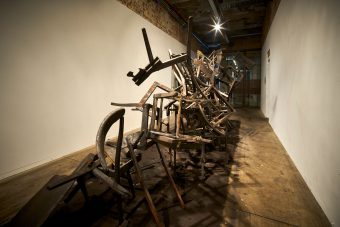This is part of a series of ekphrastic poems presented alongside ‘Hyphenated’ at The Substation. ‘Irhil’ responds to Rushdi Anwar’s ‘Irhal (Expel), Hope and the Sorrow of Displacement;


Irhal (Expel), Hope and the Sorrow of Displacement,
2013 – ongoing
Burnt wooden chairs, black pigment and charcoal
Dimensions variable
This work is an installation consisting of burnt chairs. They are installed as an interlocking pile. The chairs are not joined/fixed but placed on top of one another. Weight and gravity hold them up, forming a solid work that stands in the space. Irhal (Expel), Hope and the Sorrow of Displacement meditates on displacement, a concept that affects millions of people around the globe who are forced to flee their homes because of political, social, environmental or economic factors. Discarded objects (chairs) were utilised to explore notions of fragility, uncertainty and limitation that often accompany displacement. The artist has used these commonplace objects (chairs) as a metaphor for “home and place”. Domestic chairs are objects designed for comfort and relaxation, however he has manipulated and transformed the chairs into dysfunctional objects. The chairs have been burnt and deformed, that became a metaphor for the abandonment of “home and place”. The chairs were burnt and transformed into something non-functional. The burnt chairs undermine the feeling of safety and home. This creates a sense of feeling of vulnerability and absence. It suggests a state of absence and presence and acts as a metaphor for the place and displacement.
About the Artist
Rushdi Anwar is a Melbourne-based artist originally from Kurdistan. He is working between Australia and Thailand. His installation, sculpture, painting, photo-painting, and video work often reflect on the socio-political issues of Kurdistan, Iraq and The Middle East. Which exploring these issues through an investigation of form, material vocabulary and processes of making. His works reference the social and political unrest that extend to generate discourse about the status of social equity. His work also have a broader message and talk to us of care, attention and even redemption through art.
He was educated in Kurdistan and Australia studying at the Institute of Kirkuk- Kurdistan, Enmore Design Centre / Sydney Institute- Sydney. He holds a Master of Fine Art (MFA) 2010 and a Doctorate of Philosophy Art (PhD) 2016, in the School of Art in RMIT University, Melbourne, Australia.
He has held solo and group exhibitions widely in Australia, Austria, Bulgaria, Canada, Finland, France, Japan, Kurdistan, Norway, Switzerland, Thailand, and United Arab Emirates.

